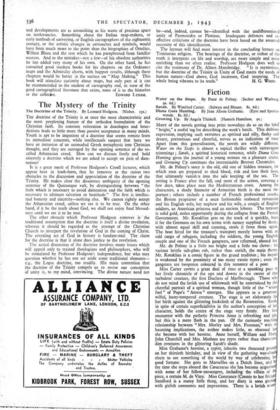The Mystery of the Trinity
The Doctrine of the Trinity. By Leonard Hodgson. (Nisbet. ass.) THE doctrine of the Trinity is at once the most characteristic and the most perplexing feature of the orthodox formulation of the Christian faith. Its constant reiteration in doxologies and bene- dictions leads to little more than passive acceptance in many minds. Youth is apt to be impatient of a doctrine that seems remote from its immediate concerns, while intellectuals suspect that here we have an intrusion of an outmoded Greek metaphysic into Christian thought, and they are outraged by the opening sentence of the so- called Athanasian creed. How can we discuss freely and hold sincerely a doctrine which we are asked to accept on pain of dam- nation?
It is great merit of Professor Hodgson's Croall lectures, which appear here in book-form, that he removes at the outset two obstacles to the discussion and appreciation of the doctrine of the Trinity. He makes clear the disastrous ambiguity of the opening sentence of the Quicunque vult, by distinguishing between " the faith which is necessary to avoid damnation and the faith which is necessary to ultimate salvation or beatitude." The first is intellec- tual honesty and sincerity—nothing else. We cannot rightly accept the Athanasian creed, unless we see it to be true. On the other hand, if it be the truth about God, we shall not enjoy final blessed- ness until we see it to be true.
The other obstacle which Professor Hodgson removes is the traditional assumption that the doctrine is itself a divine revelation, whereas it should be regarded as the attempt of the Christian Church to interpret the revelation of God in the coming of Christ. The revealing act of God in history is fundamental. The claim for the doctrine is that it alone does justice to the revelation.
The actual discussion of the doctrine involves many issues which will appeal only to trained theologians and philosophers, who will be stimulated by Professor Hodgson's independence, but who may question whether he has not set aside some traditional elements- e.g.. the Logos doctrine, too readily. His main contention that the doctrine of the Trinity compels us to revise our conception of unity is, to my mind, convincing. The divine nature need not
be—and, indeed, cannot be—identified with the undifferentiated unity of Parrnenides or Plotinus. Inadequate defences and in- effective criticisms of the doctrine have been based on the assumed necessity of this identification.
The layman will find most interest in the concluding lecture on Trinitarian religion. The bearings of the doctrine, or rather of the truth it interprets on life and worship, are more simple and more enriching than we often realise. Professor Hodgson does well to cite the testimony of Dr. Albert. Mansbridge. " It is mysterious, but the doctrine of the Trinity in Unity of God meets the needs of human nature—God above, God incarnate, God inspiring. The whole being vibrates to its truth." H. G. WOOD.


























 Previous page
Previous page